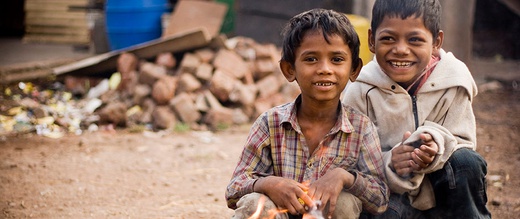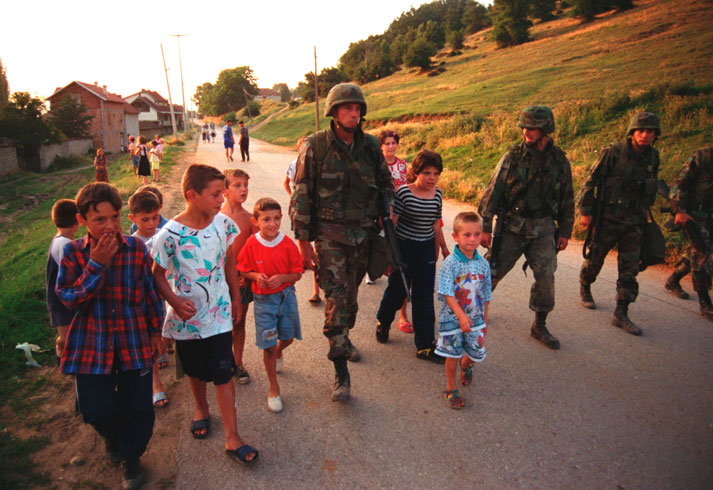The views expressed in our content reflect individual perspectives and do not represent the authoritative views of the Baha'i Faith.
Have you ever known anyone who could walk through fire without getting burned?
No?
Me neither. But I have known a few rare, remarkable people who had enormous compassion in the midst of human suffering. They could take in all that pain, and yet remain fundamentally and powerfully happy – which seems much harder than walking through fire without getting burned. When I first encountered those people, I remember thinking that what they could do – retaining their joy, their optimism, their compassion in the face of monstrous human pain and evil – had to be the most spiritual of all human accomplishments.
I met some of those remarkable people when I started participated in medical relief efforts around the world. With groups of doctors and nurses treating refugees and the poor in places like the Philippines, El Salvador and Kosovo, together our medical teams witnessed an enormous amount of human suffering. Grinding corruption, poverty and disease in the Philippines, brutal guerilla war in El Salvador, genocide and mass murder in Kosovo – all of it made many people who worked with the victims and the refugees glum and depressed, and made some permanently lose their faith in humanity itself.
We were just the aid workers — what about the victims and the refugees themselves? Many sought revenge. Some lost their sanity, or deadened their hearts. Only a few found ways to understand and forgive and rekindle hope.
I won’t sugar-coat it – when you see the worst that human beings can do to each other, loss of faith can become the default option. I remember one physician who told me what she had concluded after her experiences in Kosovo. “People are just no damn good,” she said.
Like her, many aid workers can’t take it. They burn out quickly, no matter how strong their humanitarian urge or their altruism or their initial sympathy for the human condition. I fought it myself. You can witness only so much pain and suffering before you’re tempted to begin believing that we humans as a species have such a large capacity for cruelty that we must be fundamentally flawed. I’ll give you an example.
In Kosovo in 1999, when the Serbian genocide attempted to ethnically “cleanse” the Kosovar and Albanian Muslim population, we took care of thousands of refugees who had seen their families murdered, their houses burned, their towns emptied and their life’s hopes dashed. Out of all the wounds we treated, one man stands out in my memory. Milosh came to us conscious, but he had a depressed skull fracture and severe abrasion injuries to his hands and fingers. While we quickly stabilized him and transported him to the nearest hospital Milosh told us his story.
The soldiers marched into his village at dawn and rounded up all the males, seven hundred of them, men, boys, grandfathers. The soldiers lined them up on the edge of a ditch and machine-gunned them all. But some didn’t die right away or weren’t even hit by the bullets, so the soldiers came through and used their rifle butts to kill the rest. Then a bulldozer buried them.
Milosh woke up in a mass grave, next to his father and his two sons, all dead. The butt-stroke from the rifle had not killed him, only fractured his skull and left him unconscious. He had to claw his way out of that grave with his bare hands. When he emerged night had fallen. He ran toward the Albanian border, where he eventually found our medical team. Can you imagine?
I couldn’t. I first felt enormous pain and anger at such horror and injustice. But then one of the doctors on our team told me how he dealt with the unavoidable rage you feel when you witness atrocity. “I just try,” he said, “to feel compassion for him. I try to internalize what he must feel. Then I try to heal him, so he’ll know that love is stronger than hate.”
“OK,” I said. “But what about those soldiers? How do you deal with your feelings toward them, for what they did to these innocent people?”
“You know,” my kind friend told me, “It’s hard, but I try to feel the same compassion for those soldiers, who will have to live with what they did. I try to understand how terrible their pain must be, to drive them to such extremes. I try to realize that I’d rather be Milosh than the soldiers.”
I could see, in my friend’s enormous compassion for both victims and victimizers, that he had found a way to shine through the suffering. I know this seems impossibly hard, but it also seems so pure and so right. Our conversation reminded me of a passage from the Baha’i writings that I try to remember every day:
All men have been created to carry forward an ever-advancing civilization. The Almighty beareth Me witness: To act like the beasts of the field is unworthy of man. Those virtues that befit his dignity are forbearance, mercy, compassion and loving-kindness towards all the peoples and kindreds of the earth. – Baha’u’llah, Gleanings from the Writings of Baha’u’llah, p. 214.


















Comments
Sign in or create an account
Continue with Facebookor